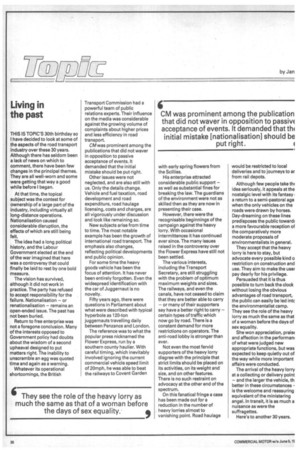Living in the past
Page 34

If you've noticed an error in this article please click here to report it so we can fix it.
THIS IS TOPIC'S 30th birthday so I have decided to look at some of the aspects of the road transport industry over these 30 years. Although there has seldom been a lack of news on which to comment, there have been few changes in the principal themes. They are all well-worn and some were getting that way a good while before I began.
At that time, the topical subject was the contest for ownership of a large part of the industry, including virtually all long-distance operations. Nationalisation caused considerable disruption, the effects of which are still being felt.
The idea had a long political history, and the Labour Government elected at the end of the war imagined that here was a controversy that could finally be laid to rest by one bold measure.
The vision has survived, although it did not work in practice. The party has refused to accept responsibility for the failure. Nationalisation — or renationalisation — remains an open-ended issue. The past has not been buried.
Return to free enterprise was not a foregone conclusion. Many of the interests opposed to Government policy had doubts about the wisdom of a second upheaval designed to put matters right. The inability to unscramble an egg was quoted time and again as a warning.
Whatever its operational shortcomings, the British Transport Commission had a powerful team of public relations experts. Their influence on the media was considerable against the growing volume of complaints about higher prices and less efficiency in road transport.
CM was prominent among the publications that did not waver in opposition to passive acceptance of events. It demanded that the initial mistake should be put right.
Other issues were not neglected, and are also still with us. Only the details change. Vehicle and fuel taxation, road development and road expenditure, road haulage licensing, costs and charges, are all vigorously under discussion and look like remaining so.
New subjects arise from time to time. The most notable example has been the growth of international road transport. The emphasis also changes, reflecting political developments and public opinion.
For some time the heavy goods vehicle has been the focus of attention. It has never been entirely forgotten. Even the widespread identification with the car of Juggernaut is no novelty.
Fifty years ago, there were questions in Parliament about what were described with typical hyperbole as 120-ton juggernauts travelling daily between Penzance and London.
The reference was to what the popular press nicknamed the Flower Express, run by a southern county haulier. With careful timing, which inevitably involved ignoring the current commercial vehicle speed limit of 20mph, he was able to beat the railways to Covent Garden
with early spring flowers from the Scillies.
His enterprise attracted considerable public support — as well as substantial fines for breaking the law. The guardians of the environment were not as skilled then as they are now in presenting their case.
However, there were the recognisable beginnings of the campaign against the heavy lorry. With occasional intermittences it has continued ever since. The many issues raised in the controversy over the Flower Express have still not been settled.
The various interests, including the Transport Secretary, are still struggling with the problem of optimum maximum weights and sizes. The railways, and even the canals, have not ceased to claim that they are better able to carry — or many of their supporters say have a better right to carry — certain types of traffic which now go by road. There is a constant demand for more restrictions on operators. The anti-road lobby is stronger than ever.
Not even the most fervid supporters of the heavy lorry disgree with the principle that strict limits should be placed on its activities, on its weight and size, and on other features. There is no such restraint on advocacy at the other end of the spectrum.
On this fanatical fringe a case has been made out for a reduction in the number of heavy lorries almost to vanishing point. Road haulage would be restricted to local deliveries and to journeys to ar from rail depots.
Although few people take thr idea seriously, it appeals at the nostalgic level with its fantasyl a return to a semi-pastoral age when the only vehicles on the roads were drawn by horses. Day-dreaming on these lines predisposes the public toward( a more favourable reception oi the comparatively more moderate proposals of environmentalists in general.
They accept that the heavy lorry is here to stay, but advocate every possible kind o restriction on construction and use. They aim to make the user pay dearly for his privilege.
Persuaded that it is thus possible to turn back the clock without losing the obvious advantages of road transport, the public can easily be led intc the environmentalist camp. They see the role of the heavy lorry as much the same as that of a woman before the days of sex equality.
She won appreciation, prais( and affection in the performani of what were judged new appropriate functions, but was expected to keep quietly out of the way while more important affairs were conducted.
The arrival of the heavy lorry at a collecting or delivery point — and the larger the vehicle, th better in these circumstances is the welcome and reassuring equivalent of the ministering angel. In transit, it is as much a nuisance as were the suffragettes.
Here's to another 30 years.


























































